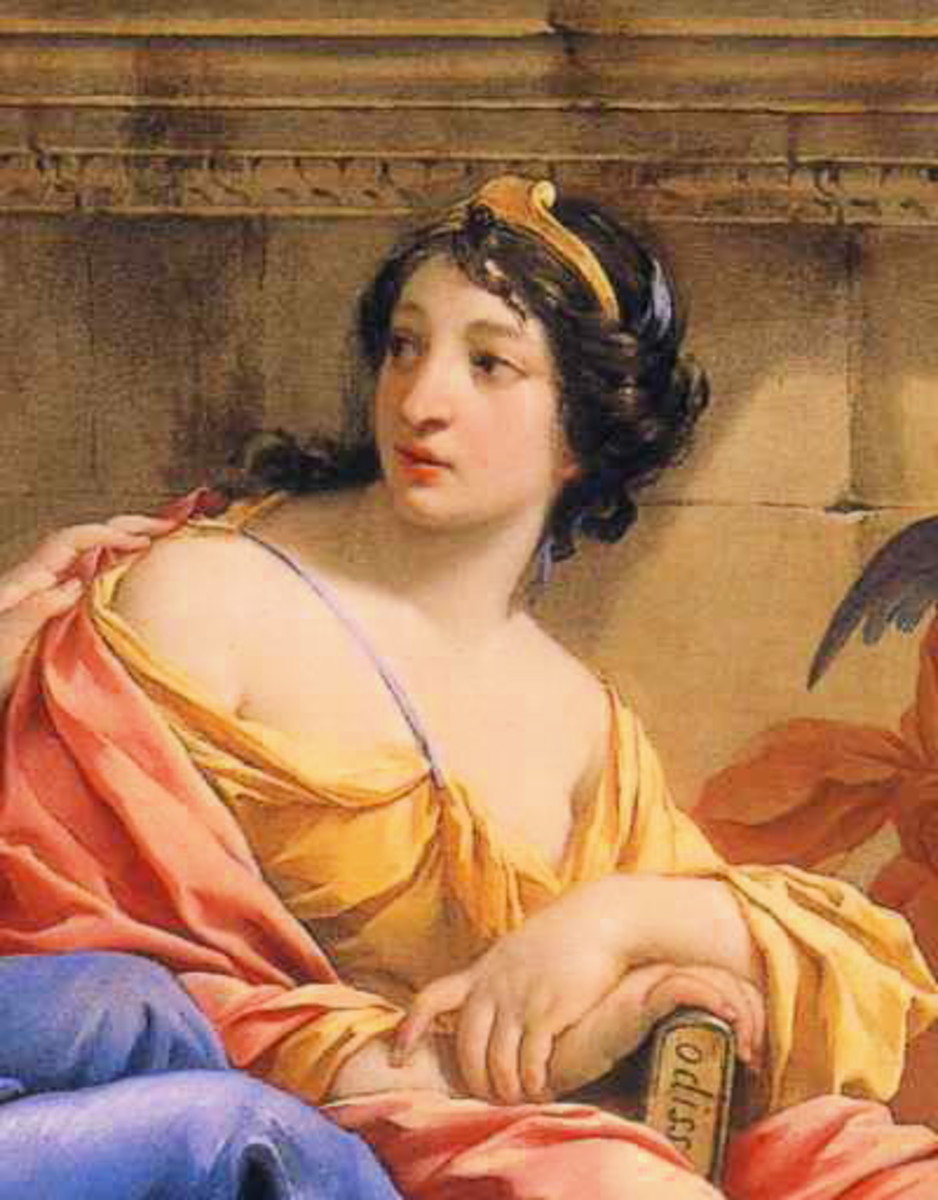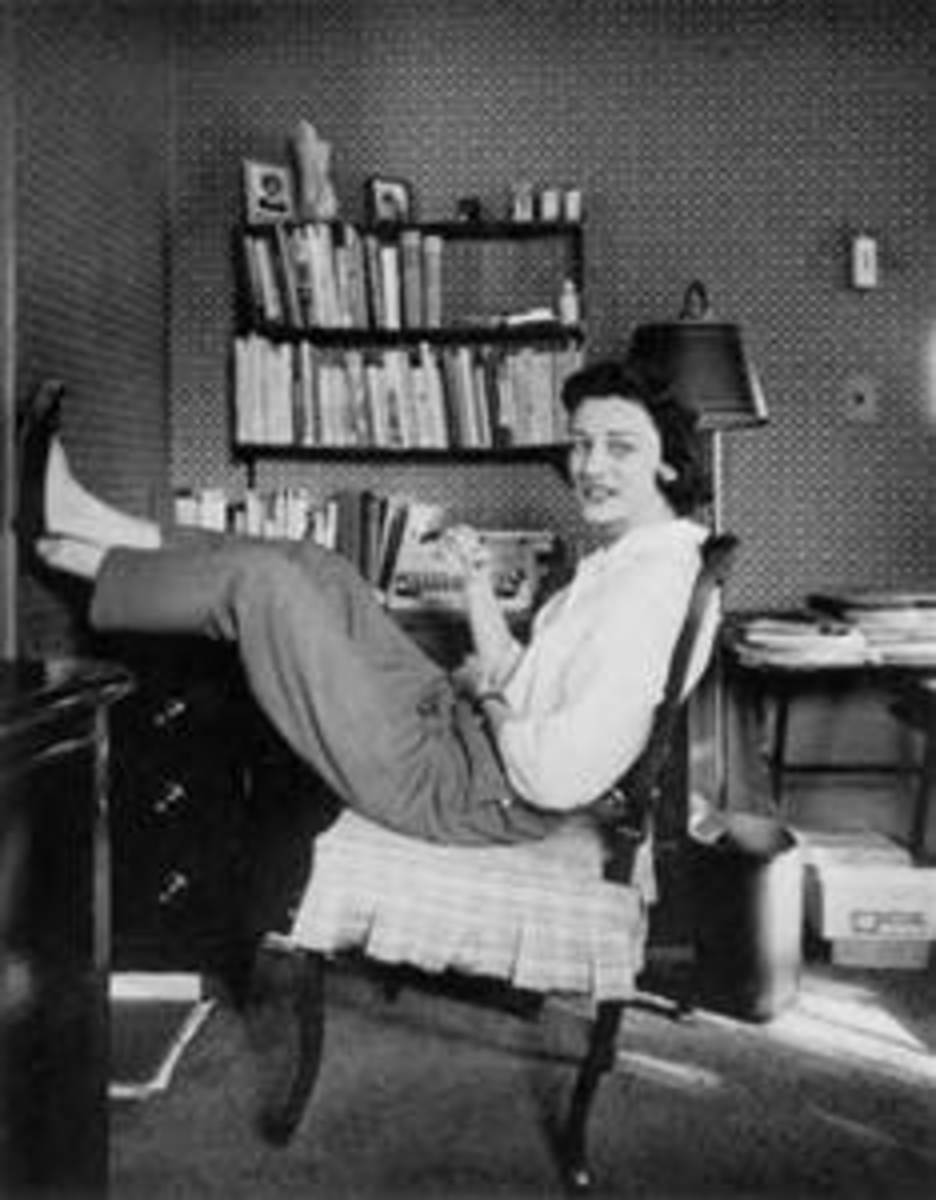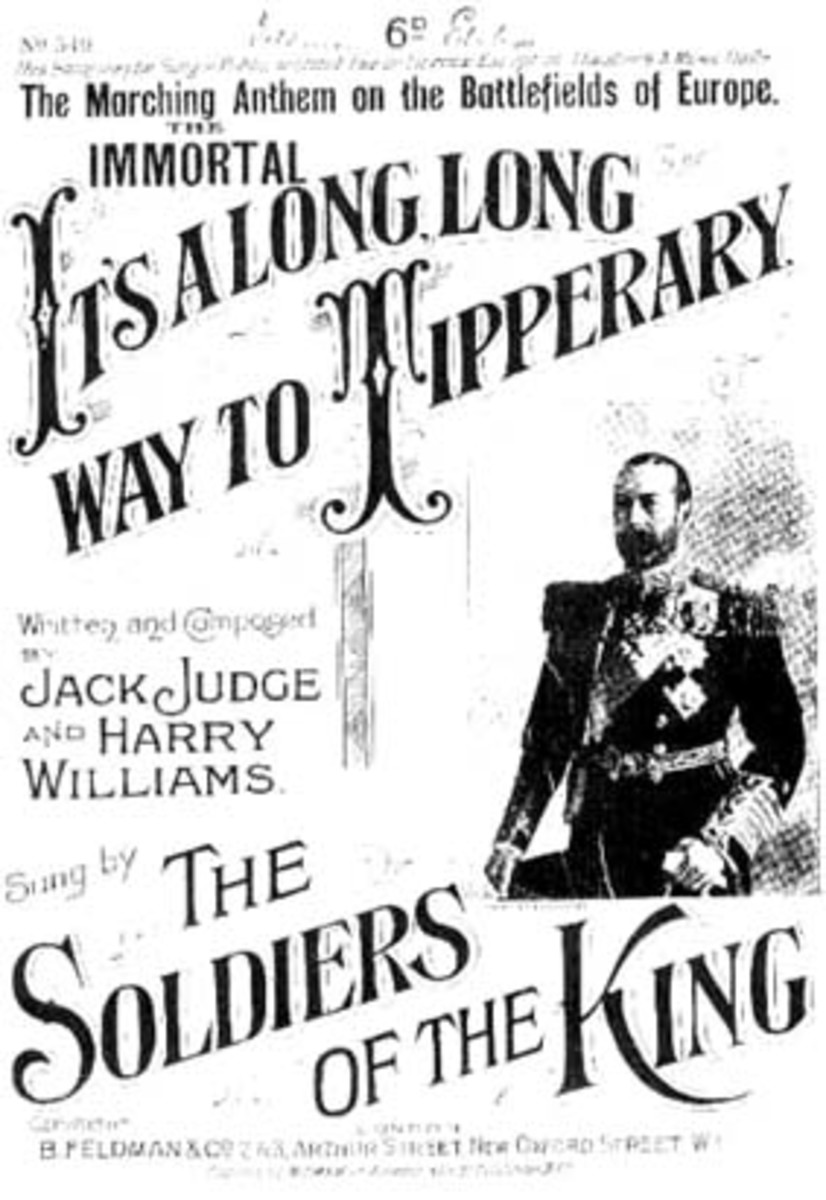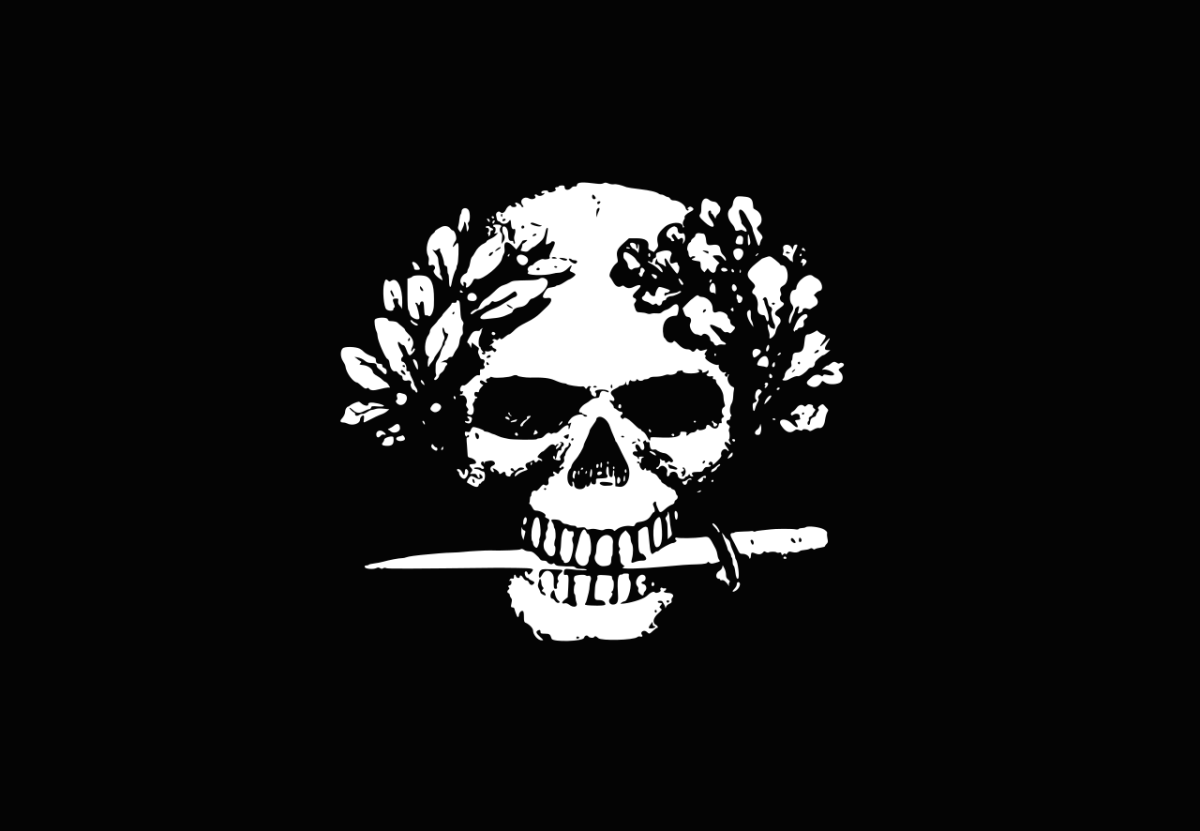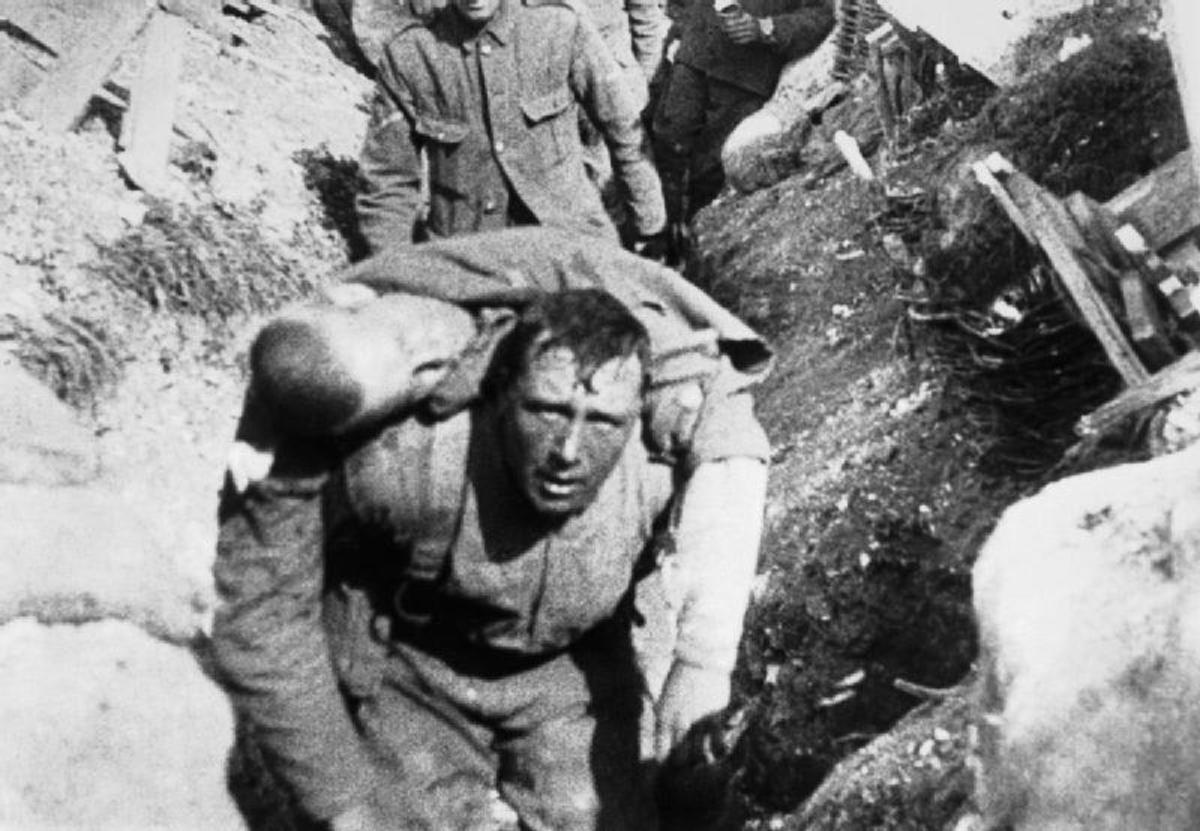- HubPages»
- Education and Science»
- History & Archaeology»
- History of the Modern Era»
- Twentieth Century History
Sorley's Weather- Charles Hamilton Sorley 1895-1915- Illustrated biography Poppy poets.c. of WW1
Charles Hamilton Sorley- 1895- 1915 -Hundred years since
It was hundred years ago on Tuesday that the poet Charles Hamilton Sorley was killed.
Sorley was twenty- one years old. He is most well known for his poetry written during WW1.
Charles Sorley was killed at the Battle of Loos on October 13th 1915.
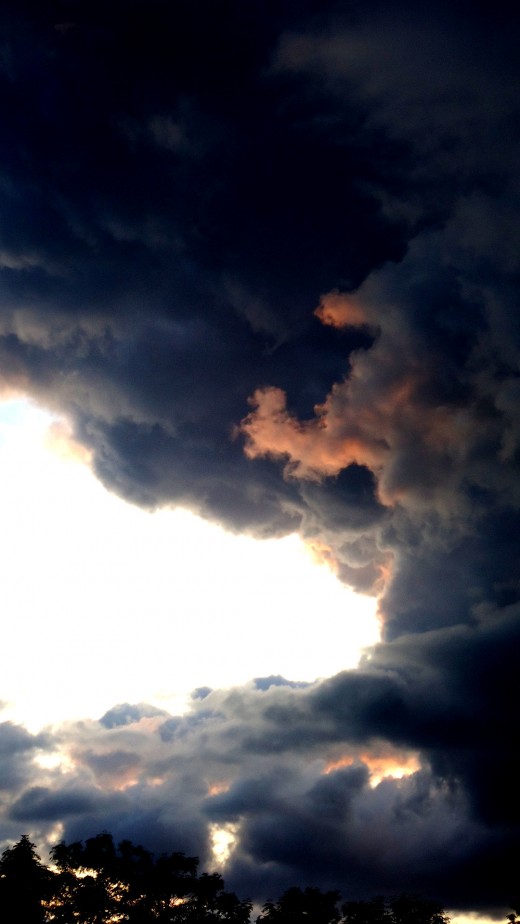

Day light never really illuminated that wintry sky.
On a walk, it is a half light day.
The slate of sky lit by a day glow sun
The rain has stained the birch like varnish, bringing all the colours out.
White and brown umbers, yellows of grasses, rushes and umbels, all skeletal.
Other sticks and debris from the downpours scatter the path.
A magenta haze to the distant birch melting into mist
The wind held it's breath
Saw an Owl that day. They do fly softly and silently, even beneath the birch canopy.
It had white tips to it's wings.
The clouds finally collapsed into a melancholy penetrating drizzle.
Pausing by the river bridge a juvenile swan is half hidden in the reeds.
Wondering on the way home -if the swan will make it to spring.
The wind is picking up again but only makes some of the trees rustle.
The drizzle turns to rain.
Inside
The rain evaporates off wet clothing by the open fire in the sitting room.
Beside it an art-space with the artworks of poets and artists turned soldiers of WW1
Their experiences left in angry, heart rending to humorous poems, letters and diaries.
They are to me, like the birch trees washed with new colours.
The vividness and landscape of their poems and biography has filled my thoughts.
The painting of Charles Sorley had been slow to develop.
Because of this I decided to find out more about Charles Hamilton Sorley.
The wind is now in gusts. It blows down the chimney to make the fire spark.
Rain pelts at the window.
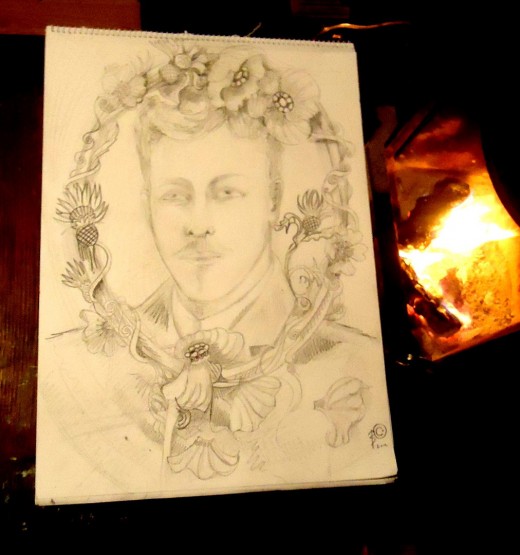
Sorley's Weather by Robert Graves
Sorley's Weather by Robert Graves
When outside the icy rain
Comes leaping helter skelter
shall I lie my restive brain
Snugly under shelter?
Shall I make a gentle song
Here in my fire lit study,
When outside the winds blow strong
And the lanes are muddy?
With old wine and drowsy meats
Am I to fill my belly?
Shall I glutton with Keats?
Shall I drink with Shelley?
Tobacco's pleasant, fire lights good:
Poetry makes both better
Clay is wet and so is mud
Winter rains are wetter.
Yet rest there, Shelley on the sill,
For through the winds come frorely,
I'm away to the rain blown hill
And the Ghost of Sorley.
Robert Graves wrote this poem after serving in the First World War.
He rated Charles Sorley as one of the finest poets of the War, along with Wilfred Owen and Isaac Rosenberg.
The words of this poem express great loss of a friend and youthful potential.
Charles Hamilton Sorley
"He was a Rebel, But a very lovable rebel" Dr Wynne Wilson
Charles Sorley was born in 1895, the elder brother of twins.
The Sorley family came from Old Aberdeen. His ancestors on both sides came from the Lowlands, Scotland. Between Tay and Tweed.
His early childhood was spent at Powys Mansion, a sprawling building on a high vantage hill.
The views expanded to the North Sea and the moorlands. There was also a vast criss-cross of railway connections and tracks.
The Sorley family were well known in the vicinity. His father William Ritchie Sorley was a Professor of Moral Philosophy. His Grandfather Sorley was a Reverend.
The other Grandfather a Journalist who spent most of his life travelling India.
His time was spent with his twin brother and elder sister somewhere in this landscape fishing and beach combing, watching horizons.
It was noted early on that Charles Sorley had high intelligence and good communications skills, he was a chatterbox.
Sometimes challenging the adults around him with questions and thoughts spoken.
His personality was described as cheerful and friendly.
All through his life the accounts are that he valued friends and family very much.
In 1900 the family moved to Cambridge because his father had been appointed by the University as a
Knightsbridge Professor.
His mother home schooled the Sorley siblings for a time.
This was important as Charles Sorley began to read and appreciate poetry during this time.
By the age of ten and a pupil at the Kings College Choir School.
Sorley began writing poetry for his Sisters school magazine
The Tempest By Charles Sorley
"The Tempest is coming
The sky is so dark
The bee has stopped humming
And down flies the lark"
Abridged
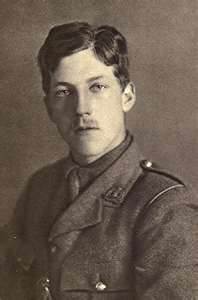
Malborough Downs
"Only the place is like a vast sea-shell where you can hear the echo of the sea, that once filled it" Charles.H. Sorley writes about his love of the surrounding countryside. He loved the height and space of the Malborough Downs.
Marlborough College
"For, past the wood and chalk pit diary.
A glimpse of Marlborough-!
So I descend beneath the rail
To warmth, and welcome and Wassail"
Charles Sorley-abridged- A letter from the trenches to a friend
"Wassail" is an Olde English expression "Be you healthy"
In 1908 Charles Sorley achieved a scholarship to Marlborough College which is in Wiltshire UK.
When he attended the College it was the first separation from his twin brother and family.
It was thought that perhaps it would be good for the twins personal development.
They were very close, although they often had a difference of opinion to the other-argued
They also looked very different, physically.
Marlborough College had many things that attracted Charles Sorley.
He loved football and athletics.
Excelled at Communications like Debates, public speaking, speeches and enjoyed company.
He had a quick wit, keen memory for people's faces and names.
Being such a direct person- his poetry began to develop to what was experienced by him.
Charles Sorley did not write from just his imagination.
He found the study of Classics like Greek plays- boring and was not afraid to complain in earnest about it. Tennyson the Classic author frustrated him because "He wrote imagined shipwrecks and battles from his bed"
Mr Sorley rated the poets Wilfred Wilson Gibson and above all John Masefield.
In the Biography and Letters of Charles Sorley, he details and is excited by one of Masefield's poems "The Widow of the Bye Street".
Charles Sorley kept a list of names of people who he "converted" to Masefields poetry.
Poets such as Masefield were controversial for the time because their backgrounds were not classical in education.
"We stand by the watershed of poetry-For the vastness and wonder of modern life, has demanded that man should know of, what they write about. Behind us our the poets of imagination: Before us are the poets of fact" Charles Sorley
This reached a high point in 1913 when Charles Sorley wanted to leave Marlborough.
He had designs to train as an instructor in a "Working Mans College"
Charles Sorley had interests in social issues outside his own privileged upbringing.
He understood the problems face by many people shaped their lives and often was lacking in options to fulfil their potentials- poverty and slums.
"I often feel terribly unworthy and untried in life-has given me no troubles or difficulties at home-such
as alone strengthens a man"
Charles Sorley made it known how he felt and his tutors began to compromise to keep his study toward Oxford.
Which he achieved by Scholarship to gain entry into Oxford during 1913.
"His personality struck me right away- his fine face. His fine head bore the stamp of individuality and intellect" Dr Wynne Wilson
Although the language in the quote is dated in expression it shows the esteem people held for him.
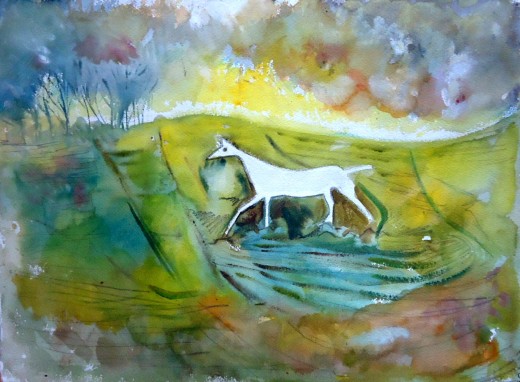
Sorley's love of rain, running & of The Downs
Charles Sorley loved running cross country. Both at Field events and as a solitary activity.
He often went on long hikes along the North Downs. These are chalk ridges that run for miles along the width of Northern and Southern England.
The landscape has much history and evidence of ancient peoples. The paths & bridleways that people trek on to this day, were made from many bygone footsteps.
Charles Sorley's early poems were inspired by this landscape and the freedom of the outdoors
"There is something in the rain
That would bid me to remain:
There is something in the wind
That would whisper, "Leave behind
All this land of time and rules,
Land of bells and early schools.
Latin, Greek and College food
DO, you precious little good.
Leave them: if you would be free
Follow, follow after me!"
From "Rain" By Charles Sorley - abridged
- The Downs were a gateway of possibilities and routes for Charles Sorley an unlimited expanse of exploration.
On one trip he treks almost to Swindon but turns off at Liddington he describes the castle
"As no more a Castle than I, it is a vast flat topped hill with a Roman Fort"
He writes that the views are astounding and sits down to read ""Wildlife in A Southern Country" As this is the spot the Author wrote from.
Another time he fell asleep under a hedge and was awoken the next day by a crowd of worried onlookers.
On occasions his Hikes made him late for Chapel Services but would make up for it by singing so loudly during hymns his voice was heard over the congregation.
Germany, squirrels & Landladys
"I am more or less Hardy Drunk" 1914 letter from Germany
Charles Sorley spent time in Germany until the outbreak of WW1.
Staying with a host family in Scherwin studying the language and local culture.
Charles Sorley baffled his hosts by sleeping with his bedroom window open.
His outspoken comments also got him into trouble. During a debate with his host Charles declared "That all food is the same-substance"
At mealtime his host served up a hot dinner but served to Charles Sorley a dry large loaf, inviting him to eat his own words "As all food is the same to Mr Sorley"
He read poetry by Thomas Hardy and admitted he liked his poems in a letter. Charles Sorley also rated Faust.
Charles Sorley then moved to lodgings where he studied at the University of Jena.
"My Landlady keeps a partly tame squirrel, a charming animal whose only fault is it mistakes my bed for it's own" Letter 1914
The tame squirrel caused Charles further hassle when health inspectors came to see his Landlady after complaints were made about the animal.
He helped his land lady diffuse the situation and the squirrel remained "resident."
"I hope you do not object to my Scot's habit of keeping tight hold of my tuppences and sending the letter via Keerr" Letter 1914
During the build up to World War 1 Charles Sorley voiced his concern that Germany seemed such an organised Country-he hoped England would never have to go to war against them.
Shortly after this he was detained at Trier and then sent back to England.
"From the train carriage I could see that some of the Germans wore strange Waterloo hats"
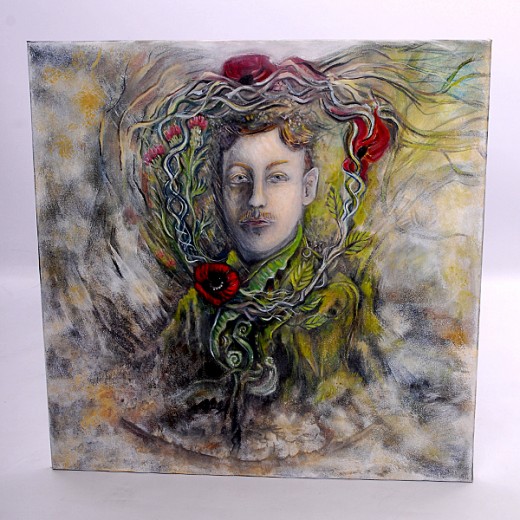
Charles Sorley- On arrival at training barracks
"They detected ultra strong Religious instincts, and told me to take my Platoon to Church.
I did not manage to do this through not being able to find my Platoon.
But instead took someone else's" Charle H Sorley's arrival at training Barracks 1914
From the Trenches
On returning to England he applied for an Army commission during 1914. There was a delay.
Charles Sorley was just considering to "Enlist as an conscript-the most heroic thing to do"
when he noticed in the "Gazette" newspaper his name.
It was in the Military list marked as a 2nd Lieutenant of the 7th Battalion of the Suffolk Regiment.
His Military training begun - some of it Musketry training which he enjoyed.
On 30th May 1915 as an Lietenant he was sent to the frontlines of France.
Serving with his Battalion at trenches in Plaegstreet.
By that August Charles Sorley was promoted to Captain.
A major British Offensive began under Field Marshall Sir John French.
It would become known as The Battle Of Loos. It began on the 25th of September 1915.
The British used poisonous gases for the first time- the prevailing winds blew some of it back, choking men who found the issued Gas-masks to difficult to breathe in or see out of.
Captain Charles Sorley fell on the afternoon of the 13th of October.
Taken out by a sniper- whilst leading his Battalion.
He was shot in the side of the head.
It is recorded it happened at the "Hairpin" trench at Hulluch.
Charles Sorley was just twenty years old.
The Battle of Loos ended with minor gains for the British on October the 14th.
Because of the mess of aftermath the Field Marshall- Sir John French lost all support from Government and the Military. He was replaced by Haig.
The Poet Robert Graves survived the Battle of Loos.
There were 50,000 casulties
The estimated losses of soldiers and Officers who were killed was 20.605 men.
Today an Memorial is dedicated to these men at Loos.
Charles Sorley had his poems published posthumously in January 1916.
On November 11th in 1985, Sorley was among 16 Great War Poets commemorated on a slate stone
in a corner of Westminster Abbey, London.
Such, such is Death by Charles Sorley
Such, such is death: no triumph: no defeat
Only an empty pail, a slate rubbed clean
A merciful putting away of what might have been.
And this we know:Death is not life:effate
Life crushed, the broken pail, We who have seen
So marvellous things know well the end not yet
Victor and vanquished are a-one in death
Coward and brave: friend, foe, Ghosts do not say,
"Come what was your record when you drew breath?"
But a big blot has hid each yesterday
So poor, so manifestly incomplete,
And your bright Promise, withered long and sped,
is touched, stirs, rises, opens and grows sweet
And blossoms and is you, when you are dead.
Charles Sorley
The Poet John Masefield went on to become a Poet Laureate in 1939 up until his death in 1967.
During his lifetime he expressed that poetry had lost a voice when Charles Sorley was killed during WW1.
John Masefield considered Sorley the finest poet of World War 1.
"Along the path where water lilies grew
The stars are placid
On the evening blue
Burning like eyes, so calm
So unafraid
On all that God has given
& Man has made
Abridged- John Masefield
The song of the Ungirt Runners By Charles Sorley
We swing ungirded hips
And lightened are our eyes,
The rain is on our lips,
We do not run for prize,
We know not whom we trust,
Nor wither-ward we fare,
But we run because we must,
Through the great wide air
The rain is on our lips
We do not run for prize,
But the storm, the water whips
And the waves howls to the skies.
The winds arise and strike it
And scatter like the sand,
And we run because we like it
Through the broad bright land
Abridged from The Ungirt runners by Charles Sorley
"There was so much more left that I would like to say to you"
Charles H Sorley in letter to friend
Sources
The Biography & Letters of Charles Hamilton Sorley - Project Gutenberg
Further reading about poets of WW1
- Jakob Van Hoddis -Expressionist poet- Weltende 1887-...
The biography of Jakob Van Hoddis the Expressionist poet 1887-1942 - Alfred Lichtenstein-Poetic & grotesque Expressionis...
Biography poetic portraits of Expressionist Alfred Lichtenstein 1889-1914 - Reinhard Johannes Sorge "The Beggar" 1892- 1916 Ill...
The Expressionist Poet and Playwright of - Alan Seeger 1888-1916 loved France, coffee, chocolat...
An illustrated biography of American Alan Seeger 1888-1916. A promising poet who lived on Staten Island and Mexico throughout his life. Also details of the Alan Seeger Natural Area being protected under the Old Growth Forest Network. - From football to Favreuil- The achievement and traged...
Biography and Paintings about Walter Tull 1888-1918 One of the first Black professional football players and the first black British Officer in the Army. There is also information about the Football Battalion of WW1

